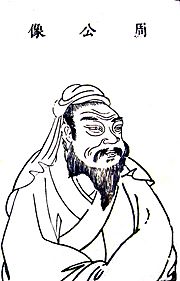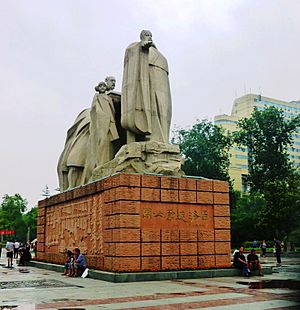Duke of Zhou facts for kids
Quick facts for kids Dan, Duke of Zhou 周公旦 |
|||||||||
|---|---|---|---|---|---|---|---|---|---|
| Duke of Zhou | |||||||||

Portrait of the Duke of Zhou in Sancai Tuhui
|
|||||||||
| Regent of Zhou Dynasty | |||||||||
| Reign | 1042 BC - 1035 BC alongside Duke of Shao and Jiang Ziya |
||||||||
| Issue | Bo Qin Junchen, Duke Ping of Zhou Fan Bo Jiang Boling Yin Pengshu Mao Shu Zuo Bo Ji Bo |
||||||||
|
|||||||||
| Father | King Wen of Zhou | ||||||||
| Mother | Tai Si | ||||||||
| Duke of Zhou | |||||||||||||||||||||||||
|---|---|---|---|---|---|---|---|---|---|---|---|---|---|---|---|---|---|---|---|---|---|---|---|---|---|
| Chinese | 周公旦 | ||||||||||||||||||||||||
| Literal meaning | "Dàn, Duke of Zhou" | ||||||||||||||||||||||||
|
|||||||||||||||||||||||||
| Alternative Chinese name | |||||||||||||||||||||||||
| Chinese | 姬旦 | ||||||||||||||||||||||||
| Literal meaning | (personal name) | ||||||||||||||||||||||||
|
|||||||||||||||||||||||||
Dan, the Duke of Zhou (Chinese: 周文公旦; pinyin: Zhōu Wén Gōng Dàn), often called the Duke of Zhou (Chinese: 周公; pinyin: Zhōu Gōng), was a very important person in the early Zhou dynasty of China. He played a big part in making the new Zhou kingdom strong. He was known for being a loyal and skilled leader (called a regent) for his young nephew, King Cheng. The Duke of Zhou successfully stopped a big rebellion and made the Zhou dynasty's rule strong across eastern China. He is also seen as a hero who helped create important Chinese writings like the I Ching and Book of Poetry. He also set up rules for ceremonies (Rites of Zhou) and classical music (yayue).
Contents
Life of the Duke of Zhou
His personal name was Dan. He was the fourth son of King Wen of Zhou and Queen Tai Si. His older brother, King Wu, defeated the Shang Dynasty in a big battle around 1046 BC. King Wu then became the first king of the Zhou Dynasty. King Wu gave many lands to his family and followers. Dan received the original Zhou territory near what is now Luoyang.
Becoming Regent
Only two years after becoming king, King Wu died. He left the kingdom to his young son, King Cheng. The Duke of Zhou became the regent, meaning he ruled the kingdom for his young nephew. This led to some people rebelling. Both unhappy Shang supporters and even some of his own relatives, like his older brother Guan Shu, started revolts.
Stopping Rebellions
Within five years, the Duke of Zhou managed to defeat these rebellions, including the one by the Three Guards. His armies moved east, bringing more land under Zhou control. This helped the Zhou dynasty become even stronger and more stable.

Mandate of Heaven
The Duke of Zhou is famous for explaining the idea of the Mandate of Heaven. This idea said that Heaven (a higher power) gives the right to rule to a fair and good leader. If a ruler became unfair or bad, Heaven would take away their right to rule. This idea helped explain why the Zhou dynasty replaced the Shang dynasty. It said that the Shang rulers had been unfair, so Heaven chose the Zhou to take over and bring order back.
Building a New Capital
The Duke of Zhou also made his brother's feudal system stronger. This system was like a way of organizing the kingdom by giving land to loyal people. He even built a new "holy" city called Chengzhou around 1038 BC. This city was carefully planned. King Cheng, the Shang nobles, and the important nine tripod cauldrons (symbols of imperial rule) lived in Chengzhou. The Duke continued to rule the kingdom from the old capital, Haojing. Once King Cheng was old enough, the Duke of Zhou honorably gave up his power and let King Cheng rule on his own.
Legacy of the Duke of Zhou
The Duke of Zhou had eight sons, and they all received land from the king. His eldest son received the land of Lu. His second son took over his father's original territory.
Honored by Emperors
Later emperors thought the Duke of Zhou was a perfect example of a good and wise leader. They gave him special titles after he died. The empress Wu Zetian in the 8th century even named her short-lived dynasty after him. She called him the Honorable and Virtuous King. In 1008, the Zhenzong Emperor gave the Duke the title King of Exemplary Culture. He was also known as the First Sage.
In 2004, Chinese archaeologists thought they might have found his tomb complex in Qishan County, Shaanxi.
God of Dreams
The Duke of Zhou is also known as the "God of Dreams." The Analects record Confucius saying, "How I have gone downhill! It has been such a long time since I dreamt of the Duke of Zhou." Confucius meant that the good ideas of the Duke of Zhou's government had faded away. But later, people took this literally. In Chinese legends, if something important is going to happen to someone, the Duke of Zhou will let them know through dreams. This is why there's a Chinese saying, "Dreaming of Zhou Gong." A book called Zhou Gong's Explanations of Dreams is said to be written by him.
Descendants of the Duke
The main family line of the Duke of Zhou's descendants came from his first son, Bo Qin. Bo Qin's third son, Yu, had descendants who took the family name Dongye. The Duke of Zhou's family also held the title of Wujing Boshi.
Mencius, a famous Chinese philosopher, was also a descendant of the Duke of Zhou. His family line came from Duke Huan of Lu's son, Qingfu.
Some famous families, like the Zhikou Chiangs (which includes Chiang Kai-shek), are believed to be descendants of the Duke of Zhou's third son.
Images for kids
See also
 In Spanish: Duque de Zhou para niños
In Spanish: Duque de Zhou para niños
 | Calvin Brent |
 | Walter T. Bailey |
 | Martha Cassell Thompson |
 | Alberta Jeannette Cassell |


